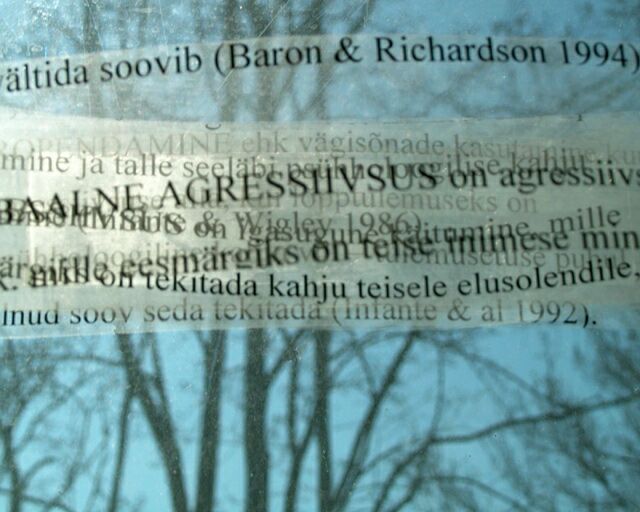"Cultural Processes in the Changing Society: Tradition and Creativity in Post-socialist Humour", ESF 8149
Agressiivsus. Photo: Liisi Laineste
The present research project will continue the two four-year grant periods funded by the Estonian Science Foundation (ESF), namely grants No 4935 and 6759 (“Estonian Contemporary Folk Humour”, 2001 – 2005, and “Contemporary Jokelore: Post-socialism – Internet – Cognitivity”, 2005 – 2009, grant holder A. Krikmann). The next step is to widen the research area and probe the issues of ethnic and political humour and new evolving genres in youth humour (e.g. Internet humour) on the background of large-scale societal and cultural processes, focusing on the Eastern European cultural space. Key problems: (1) intolerance: Describing intercultural conflicts and humour, the role of creativity and tradition in helping to shape the „humour identity“ of post-socialist societies, the uses of joke texts in political discourse (L. Laineste); cultural differences in humour communication / appreciation (A. Krikmann & L. Laineste); the interaction between humour and value shifts (M. Rebane); . (2) Internet: Characterising the interaction of the new media with both the content and form of (youth) humour, giving an account on the issues of anonymity and authorship, orality and literacy (L. Laineste), universality and specificity of Internet (joke)lore (A. Krikmann & L. Laineste), and describing the implications of these in the conflicts about tastes in humour (L. Laineste); . (3) Humour theory and its critique: Showing the social and individual traits in humour production and comprehension, describing the mechanism of humour through analysing the notion of incongruity (A. Krikmann), discussing the nature of the categories "good" and "bad" in (ethnic and other) jokes (A. Krikmann & L. Laineste), in order to create a comprehensive, integrative and ecologically more valid theory of humour. . The research will combine quantitative (counts of relative incidence of texts, their distribution, etc) and qualitative (content analysis, (on-line) interviews, etc) analysis; relying on new material specifically gathered for case studies and the already existing database of Estonian jokelore, which will be extended to cover the Eastern European region. . As a result, the project will foster academic contacts, by sustaining the existing cooperation networks as well as searching out new projects and opportunities. It will also produce a number of articles on research results, especially in English-language academic publications with high impact factor, which is another priority. EKM Fo , |